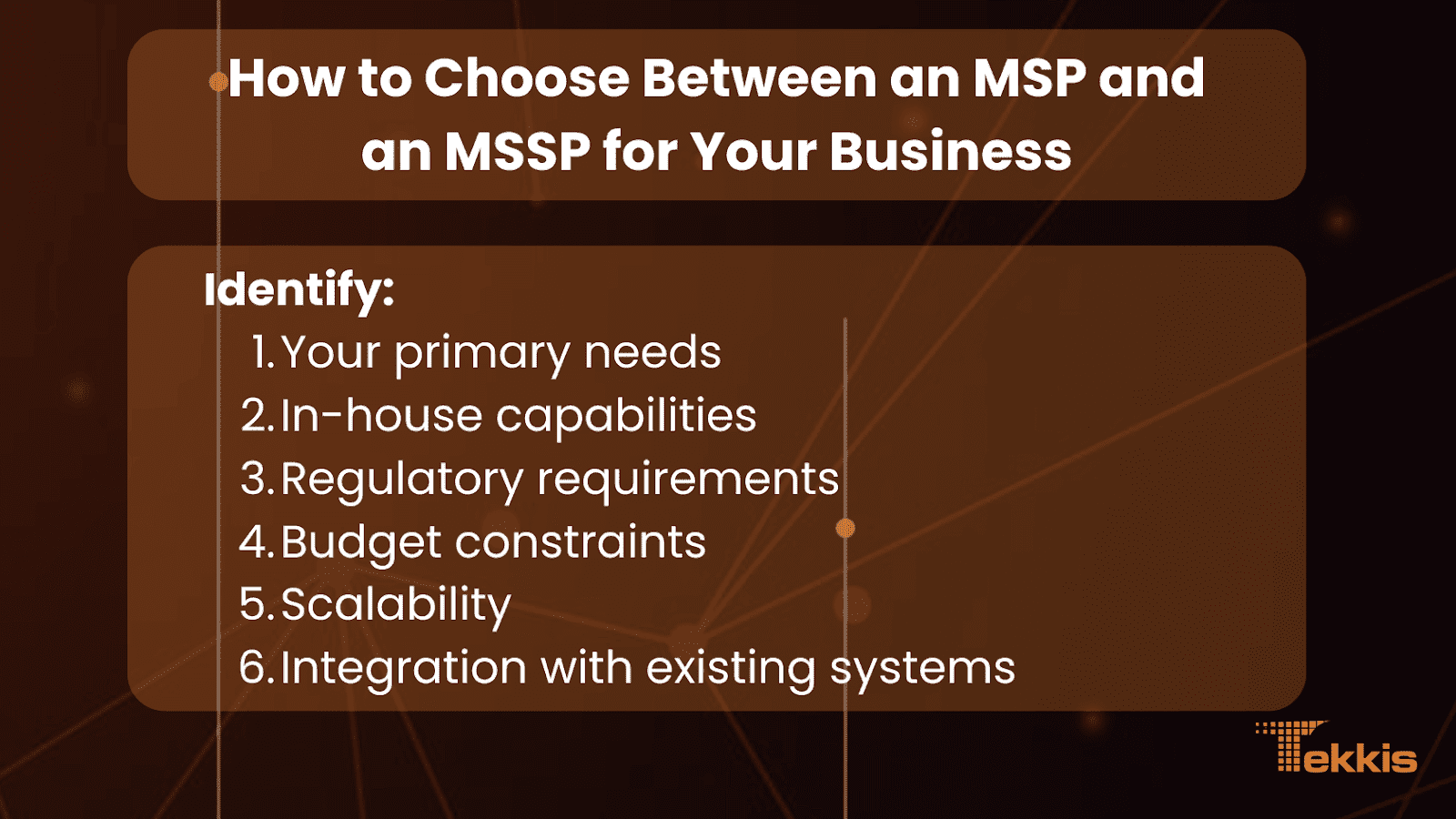MSPs vs. MSSPs: Which Does Your Business Need?
Managed Service Providers (MSPs) and Managed Security Service Providers (MSSPs) offer specialized expertise in IT and cybersecurity.
An MSP is a company that remotely manages IT infrastructure and end-user systems, providing services such as network management, cloud services, help desk support, and software updates.
In contrast, an MSSP focuses on cybersecurity, outsourcing the monitoring and management of security devices. Their services include threat detection, incident response, and vulnerability assessments.
As we explore MSPs and MSSPs, we will highlight their differences and overlaps and explain how businesses can choose the right service provider for their needs. At Tekkis, we’re here to help you navigate these options. Let's work together to identify the best solutions for your business's IT and security needs!

Key Differences Between MSPs and MSSPs
Understanding the difference between MSP and MSSP is crucial for businesses looking to optimize their IT operations and security posture. While both types of providers offer managed services, their focus and expertise differ significantly.
Primary Functions of an MSP
An MSP, or Managed Service Provider, is primarily concerned with the overall management and optimization of a company's IT infrastructure. The MSP technology meaning encompasses a broad range of services aimed at improving efficiency and reducing downtime. Here are some critical functions of an MSP:
- Network management and monitoring
- Cloud services and infrastructure management
- Data backup and disaster recovery
- Software updates and patch management
- Help desk and technical support
- IT strategy and consulting
MSPs are designed to be a one-stop-shop for a company's IT needs, handling day-to-day operations and long-term planning. They focus on keeping systems running smoothly and efficiently, allowing businesses to concentrate on their core competencies.
Core Responsibilities of an MSSP
On the other hand, an MSSP, or Managed Security Service Provider , specializes in cybersecurity. The MSSP cybersecurity revolves around protecting an organization's digital assets from threats and ensuring compliance with security regulations. MSSPs focus narrowly on cybersecurity, offering services such as incident response, compliance management, and security assessments, while MSPs handle broader IT management and optimization. Some core responsibilities of an MSSP include:
- 24/7 security monitoring and threat detection
- Incident response and management
- Vulnerability assessments and penetration testing
- Security policy development and implementation
- Compliance management and reporting
- Security awareness training for employees
MSSPs are experts in identifying, mitigating, and responding to security threats. They employ advanced tools and techniques to protect organizations from increasingly sophisticated cyber attacks.
Why Security Matters in Managed Services
The importance of security in managed services cannot be overstated. As businesses become more digitally dependent, the risk of cyber-attacks and data breaches increases exponentially. This is where the MSP MSSP meaning becomes particularly relevant.
While traditional MSPs focus on overall IT management, many are now incorporating security services into their offerings. These MSP security services might include basic firewall management, antivirus updates, and simple security audits. However, these services often need more comprehensive security solutions provided by dedicated MSSPs.
The growing emphasis on security has led to a blurring of lines between MSPs and MSSPs. Some MSPs are expanding their security capabilities, while some MSSPs are broadening their service offerings to include more general IT management tasks. This convergence reflects the increasing recognition that effective IT management and robust cybersecurity are two sides of the same coin.
Exploring the Grey Area: MSPs with Security Offerings
The line between Managed Service Providers (MSPs) and Managed Security Service Providers (MSSPs) is becoming increasingly blurred. This grey area has given rise to a new breed of service providers: MSPs with robust security offerings. These hybrid providers aim to offer the best of both worlds, combining comprehensive IT management with advanced cybersecurity capabilities.
The emergence of MSP cyber security services is a response to the growing demand for integrated IT and security solutions. In 2022, there were approximately 150,000 managed service providers (MSPs) in the United States. Many of these MSPs are expanding their portfolios to include security services, recognizing the critical importance of cybersecurity.
- Network security monitoring and management
- Endpoint protection
- Email security
- Data encryption
- Backup and disaster recovery with a security focus
- Basic security awareness training
These services represent a significant step up from traditional MSP offerings, addressing the growing cybersecurity needs of small and medium-sized businesses. However, while these services are valuable, they may not be as comprehensive or specialized as those offered by dedicated MSSPs.
MSPs in North America dominate about 13% of the total Information Technology and Communications (ITC) market, which is approximately $120 billion in revenue. This substantial market share indicates the trust businesses place in managed service providers. As these MSPs incorporate more security services, they're positioned to capture an even larger portion of the market.
Companies like Tekkis are at the forefront of this trend, offering a unique blend of managed services and advanced security solutions. Tekkis's mission to provide enterprise-grade security without sacrificing performance aligns perfectly with the evolving needs of modern businesses. Their range of services, including cybersecurity, ethical hacking, and MSSP services, exemplifies the convergence of traditional MSP offerings with specialized security capabilities.
The managed service provider cyber security model offers several advantages:
- Integrated approach: By combining IT management and security services, businesses can enjoy a more cohesive and streamlined approach to their technology needs.
- Cost-effectiveness: For smaller businesses, working with a single provider for both IT and security can be more cost-effective than engaging separate MSP and MSSP services.
- Simplified vendor management: Having a single point of contact for IT and security matters can simplify operations and improve communication.
However, it's crucial to carefully evaluate the depth and breadth of security services offered by MSPs. While many MSP security services are robust, they may not match the specialized expertise and advanced tools provided by dedicated MSSPs, especially for organizations with complex security requirements or those in highly regulated industries.

How to Choose Between an MSP and an MSSP for Your Business
When it comes to managing your IT infrastructure and securing your digital assets, the choice between an MSP and an MSSP can significantly impact your business operations. Understanding the nuances of MSP vs MSSP is crucial in making an informed decision that aligns with your organization's needs and goals.
What is an MSP in business? An MSP, or Managed Service Provider, is an external partner that manages a company's IT infrastructure and end-user systems. They handle day-to-day IT operations, allowing businesses to focus on their core competencies. MSPs typically serve around 122 clients, with 69% having fewer than 100 clients. The majority of their clients are small or micro businesses. This statistic underscores the MSP's role in supporting smaller organizations that may not have extensive in-house IT resources.
On the other hand, MSSP IT services focus specifically on cybersecurity. An MSSP, or Managed Security Service Provider like Tekkis in Denver, offers specialized security monitoring, threat detection, and incident response services. They are equipped to handle complex security challenges and stay ahead of evolving cyber threats.
When deciding between an MSP and MSSP, consider the following factors:
- Your primary needs: If your main concern is overall IT management and support, an MSP might be the better choice. If security is your top priority, an MSSP would be more suitable.
- In-house capabilities: Assess your existing IT team's skills. If you lack security expertise, an MSSP can fill that gap effectively.
- Regulatory requirements: If your industry has strict compliance standards, an MSSP might be better equipped to ensure you meet these requirements.
- Budget constraints: Generally, MSSPs are more expensive due to their specialized services. However, the cost should be weighed against the potential financial impact of a security breach.
- Scalability: Consider your future needs. Some businesses might start with an MSP and transition to an MSSP as they grow and their security needs become more complex.
- Integration with existing systems: Evaluate how well the provider's services can integrate with your current IT infrastructure.
It's worth noting that the line between MSP and MSSP services is becoming increasingly blurred. Many providers now offer a hybrid approach, combining elements of both MSP and MSSP services. This is where companies like Tekkis shine, offering a comprehensive suite of services that span both IT management and advanced security.
Tekkis, for instance, provides a unique blend of MSP and MSSP services. Their offerings include traditional MSP services like network engineering and disaster recovery alongside MSSP-specific services such as ethical hacking, penetration testing, and digital forensics. This holistic approach allows businesses to address both their IT management and security needs through a single, integrated provider.
When evaluating potential providers, consider asking the following questions:
- What specific services are included in your offering?
- How do you stay updated on the latest security threats and technologies?
- What is your incident response process?
- Can you provide case studies or references from clients in my industry?
- How do you handle compliance requirements for my sector?
Remember, the goal is to find a provider that not only meets your current needs but can also support your business as it grows and evolves. Whether you choose an MSP, an MSSP, or a hybrid provider like Tekkis, ensure they align with your business objectives and can deliver the level of service and security your organization requires.
Ultimately, the choice between an MSP and an MSSP (or a provider offering both services) should be based on a thorough assessment of your business needs, security requirements, and long-term IT strategy. By carefully considering these factors, you can make an informed decision that enhances your IT capabilities and strengthens your overall security posture.

Does My Business Need an MSP and MSSP?
Many businesses wonder whether they need both an MSP and an MSSP. The answer often depends on the organization's specific needs, size, and industry. Let's explore this question in depth and consider scenarios where both services might be necessary.
Scenarios When Both Are Necessary
There are several situations where leveraging both MSP and MSSP services can provide significant benefits:
- Rapid growth: As businesses expand, they often outgrow their existing IT infrastructure. An MSP can help manage this growth, while an MSSP ensures that security scales alongside it.
- Complex regulatory environments: Industries like healthcare or finance face strict compliance requirements. An MSP can handle general IT needs, while an MSSP focuses on maintaining compliance and security standards.
- Hybrid work environments: With the rise of remote work, businesses need robust IT support (MSP) and enhanced security measures (MSSP) to protect distributed networks.
- Digital transformation initiatives: As companies modernize their operations, they require both IT management (MSP) and advanced security (MSSP) to navigate the challenges of new technologies.
- High-risk industries: Sectors that are frequent targets for cyberattacks may benefit from the comprehensive coverage offered by both an MSP and MSSP.
By partnering with an MSP, businesses can achieve substantial cost savings, reducing IT costs by 25-45 percent and boosting operational efficiency by 45-65 percent. When combined with an MSSP's specialized security services, these benefits can be even more significant.
Evaluating Service Provider Partnerships
When considering MSP and MSSP partnerships, it's crucial to evaluate potential providers carefully. Here are some key factors to consider:
- Service integration: Look for providers that offer seamless integration between MSP and MSSP services. This can improve efficiency and reduce potential security gaps.
- Expertise and certifications: Ensure that the providers have the necessary expertise and industry certifications in both IT management and cybersecurity.
- Scalability: Choose partners that can grow with your business, offering flexible services that can be adjusted as your needs change.
- Communication and reporting: Effective communication between your business and service providers is crucial. Look for partners that offer clear, regular reporting on both IT performance and security metrics.
- Proactive approach: The best MSP and MSSP partnerships take a proactive stance, identifying and addressing potential issues before they become problems.
- Cultural fit: Consider how well the service providers align with your company's culture and values. This can significantly impact the partnership's success.
When evaluating potential partnerships, it's worth considering providers like Tekkis, which offers a comprehensive suite of MSP and MSSP services. The MSP meaning in business extends beyond just IT management; it encompasses a strategic partnership that can drive efficiency and innovation. Tekkis, with its focus on both network security and IT management, exemplifies this broader definition.
Tekkis's unique value proposition of providing enterprise-grade security without sacrificing performance aligns well with businesses seeking both MSP and MSSP services. Their range of offerings, including cybersecurity, ethical hacking, network engineering, and disaster recovery, covers the spectrum of services typically provided by separate MSPs and MSSPs.
By choosing a provider like Tekkis that offers both MSP and MSSP services, businesses can enjoy several advantages:
- Simplified vendor management
- Integrated approach to IT and security
- Consistent service quality across all areas
- Potential cost savings compared to engaging separate providers
- Streamlined communication and reporting
However, it's essential to thoroughly assess whether a single provider can meet all your needs at the level of specialization required for your business.

Conclusion
In conclusion, the distinction between Managed Service Providers (MSPs) and Managed Security Service Providers (MSSPs) is vital for organizations seeking to enhance their IT and cybersecurity frameworks. While MSPs focus on a wide array of IT management services, MSSPs specialize in safeguarding digital assets through targeted security measures.
Businesses must assess their individual needs and understand the offerings of both MSPs and MSSPs. Whether they choose to partner with a dedicated MSSP for robust cybersecurity or an MSP that has bolstered its security capabilities, the goal remains the same: to create a secure and efficient IT environment. By navigating this wisely, organizations can ensure that they are not only maximizing their operational efficiency but also adequately protecting themselves against the ever-growing threat of cyber attacks. A strategic approach enables businesses to thrive, securing their assets and supporting their core objectives.
For organizations ready to elevate their IT security measures, Tekkis offers tailored solutions designed to meet your unique needs. Connect with us today to learn how we can help you bolster your cybersecurity posture and ensure your digital assets are safeguarded against emerging threats. Let’s build a secure and efficient IT environment together!



